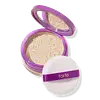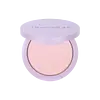What's inside
What's inside
 Key Ingredients
Key Ingredients

 Benefits
Benefits

 Concerns
Concerns

 Ingredients Side-by-side
Ingredients Side-by-side

Mica
Cosmetic ColorantSilica
AbrasiveDimethicone
EmollientMagnesium Myristate
Nylon-12
Ethylhexyl Palmitate
EmollientZea Mays Starch
AbsorbentDistarch Phosphate
AbsorbentKaolin
AbrasiveLauroyl Lysine
Skin ConditioningAscorbyl Palmitate
AntioxidantTocopherol
AntioxidantPhenoxyethanol
PreservativePolymethyl Methacrylate
Ethylhexylglycerin
Skin ConditioningMethicone
EmollientTitanium Dioxide
Cosmetic ColorantIron Oxides
Mica
Cosmetic ColorantKaolin
AbrasiveSilica
AbrasiveAluminum Starch Octenylsuccinate
AbsorbentMethyl Methacrylate Crosspolymer
Pentaerythrityl Tetraisostearate
EmollientCellulose
AbsorbentSqualane
EmollientSynthetic Wax
AbrasiveLauroyl Lysine
Skin ConditioningSorbitan Isostearate
EmulsifyingTrihydroxystearin
Skin ConditioningSilica Dimethyl Silylate
EmollientDimethicone
EmollientDicaprylyl Carbonate
EmollientMagnesium Myristate
Glyceryl Caprylate
Emollient1,2-Hexanediol
Skin ConditioningMethicone
EmollientEthylhexylglycerin
Skin ConditioningTriethoxycaprylylsilane
Iron Oxides
CI 77007
Cosmetic ColorantCI 15850
Cosmetic ColorantCI 19140
Cosmetic ColorantMica, Kaolin, Silica, Aluminum Starch Octenylsuccinate, Methyl Methacrylate Crosspolymer, Pentaerythrityl Tetraisostearate, Cellulose, Squalane, Synthetic Wax, Lauroyl Lysine, Sorbitan Isostearate, Trihydroxystearin, Silica Dimethyl Silylate, Dimethicone, Dicaprylyl Carbonate, Magnesium Myristate, Glyceryl Caprylate, 1,2-Hexanediol, Methicone, Ethylhexylglycerin, Triethoxycaprylylsilane, Iron Oxides, CI 77007, CI 15850, CI 19140
 Reviews
Reviews

Ingredients Explained
These ingredients are found in both products.
Ingredients higher up in an ingredient list are typically present in a larger amount.
Dimethicone is a type of synthetic silicone created from natural materials such as quartz.
What it does:
Dimethicone comes in different viscosities:
Depending on the viscosity, dimethicone has different properties.
Ingredients lists don't always show which type is used, so we recommend reaching out to the brand if you have questions about the viscosity.
This ingredient is unlikely to cause irritation because it does not get absorbed into skin. However, people with silicone allergies should be careful about using this ingredient.
Note: Dimethicone may contribute to pilling. This is because it is not oil or water soluble, so pilling may occur when layered with products. When mixed with heavy oils in a formula, the outcome is also quite greasy.
Learn more about DimethiconeEthylhexylglycerin (we can't pronounce this either) is commonly used as a preservative and skin softener. It is derived from glyceryl.
You might see Ethylhexylglycerin often paired with other preservatives such as phenoxyethanol. Ethylhexylglycerin has been found to increase the effectiveness of these other preservatives.
Kaolin is a clay. It is used for oil control and to help minimize pores. Like other clays, kaolin has the ability to absorb excess sebum or oil. This can help clean out pores and mattify the skin.
Some types of kaolin may have exfoliating properties. When water is added to kaolin, it becomes a paste with small abrasive particles.
Most kaolin is a white color, but may be pink/orange/red depending on where it comes from.
The name 'kaolin' comes from a Chinese village named 'Gaoling'. Kaolin clay comes from rocks rich in kaolinite. Kaolinite, the mineral, has a silicate layered structure. Kaolinite is formed from chemical weathering of aluminum siilicate minerals.
Besides skincare, kaolin is commonly used to make glossy paper, in ceramics, toothpaste, and as medicine to soothe stomach issues.
Learn more about KaolinThis ingredient comes from a fatty acid (lauric acid) and amino acid (lysine). It is used to add a silky feel to cosmetics.
According to a manufacturer, its fatty acid base leaves a silky feeling on the skin. It also has emollient properties because of this. Emollients help soften skin by preventing water from evaporating.
Lauroyl lysine is barely soluble in water.
Learn more about Lauroyl LysineWe don't have a description for Magnesium Myristate yet.
Methicone is a type of silicone and is a simpler form of dimethicone.
Silicones are used to enhance the texture of products and have emollient properties. Methicone is used to give products a silky texture and improves spreadability.
Mica is a naturally occurring mineral used to add shimmer and color in cosmetics. It can also help improve the texture of a product or give it an opaque, white/silver color.
Serecite is the name for very fine but ragged grains of mica.
This ingredient is often coated with metal oxides like titanium dioxide. Trace amounts of heavy metals may be found in mica, but these metals are not harmful in our personal products.
Mica has been used since prehistoric times throughout the world. Ancient Egyptian, Indian, Greek, Roman, Aztec, and Chinese civilizations have used mica.
Learn more about MicaSilica, also known as silicon dioxide, is a naturally occurring mineral. It is used as a fine, spherical, and porous powder in cosmetics.
Though it has exfoliant properties, the function of silica varies depending on the product.
The unique structure of silica enhances the spreadability and adds smoothness, making it a great texture enhancer.
It is also used as an active carrier, emulsifier, and mattifier due to its ability to absorb excess oil.
In some products, tiny microneedles called spicules are made from silica or hydrolyzed sponge. When you rub them in, they lightly polish away dead skin layers and enhance the penetration of active ingredients.
Learn more about SilicaThis ingredient is a combination of red, black, and yellow iron oxide pigments. This combination of colors is usually found in foundation, because it results in a "skin" color.